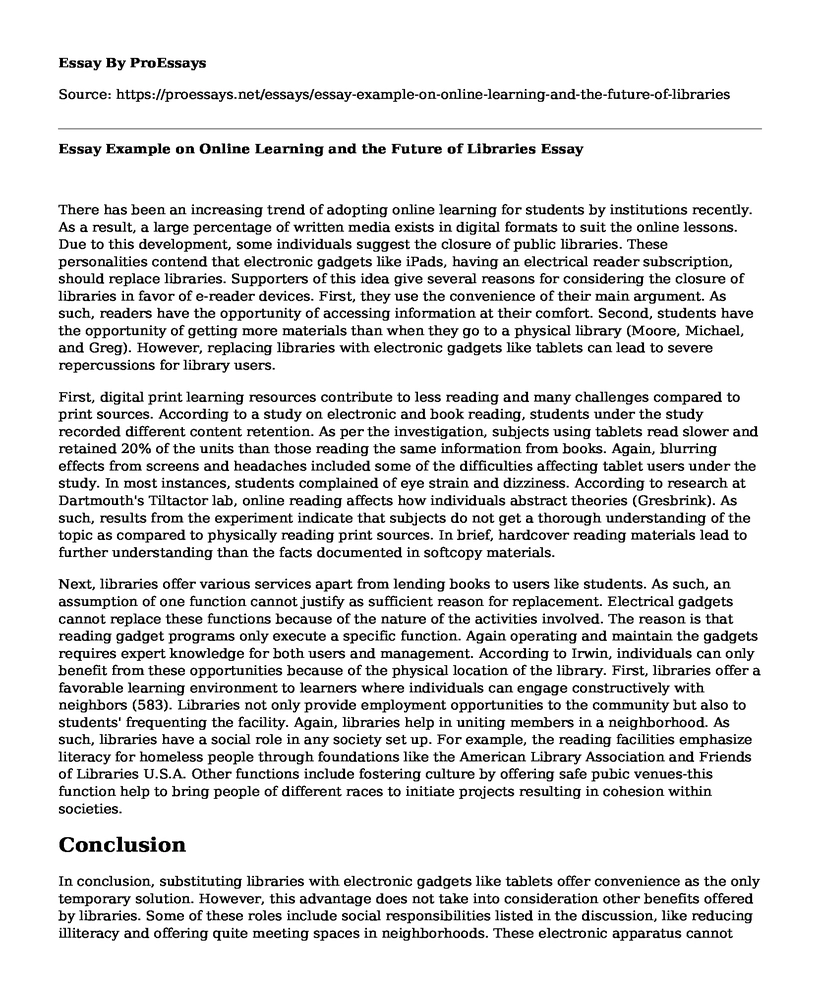There has been an increasing trend of adopting online learning for students by institutions recently. As a result, a large percentage of written media exists in digital formats to suit the online lessons. Due to this development, some individuals suggest the closure of public libraries. These personalities contend that electronic gadgets like iPads, having an electrical reader subscription, should replace libraries. Supporters of this idea give several reasons for considering the closure of libraries in favor of e-reader devices. First, they use the convenience of their main argument. As such, readers have the opportunity of accessing information at their comfort. Second, students have the opportunity of getting more materials than when they go to a physical library (Moore, Michael, and Greg). However, replacing libraries with electronic gadgets like tablets can lead to severe repercussions for library users.
First, digital print learning resources contribute to less reading and many challenges compared to print sources. According to a study on electronic and book reading, students under the study recorded different content retention. As per the investigation, subjects using tablets read slower and retained 20% of the units than those reading the same information from books. Again, blurring effects from screens and headaches included some of the difficulties affecting tablet users under the study. In most instances, students complained of eye strain and dizziness. According to research at Dartmouth's Tiltactor lab, online reading affects how individuals abstract theories (Gresbrink). As such, results from the experiment indicate that subjects do not get a thorough understanding of the topic as compared to physically reading print sources. In brief, hardcover reading materials lead to further understanding than the facts documented in softcopy materials.
Next, libraries offer various services apart from lending books to users like students. As such, an assumption of one function cannot justify as sufficient reason for replacement. Electrical gadgets cannot replace these functions because of the nature of the activities involved. The reason is that reading gadget programs only execute a specific function. Again operating and maintain the gadgets requires expert knowledge for both users and management. According to Irwin, individuals can only benefit from these opportunities because of the physical location of the library. First, libraries offer a favorable learning environment to learners where individuals can engage constructively with neighbors (583). Libraries not only provide employment opportunities to the community but also to students' frequenting the facility. Again, libraries help in uniting members in a neighborhood. As such, libraries have a social role in any society set up. For example, the reading facilities emphasize literacy for homeless people through foundations like the American Library Association and Friends of Libraries U.S.A. Other functions include fostering culture by offering safe pubic venues-this function help to bring people of different races to initiate projects resulting in cohesion within societies.
Conclusion
In conclusion, substituting libraries with electronic gadgets like tablets offer convenience as the only temporary solution. However, this advantage does not take into consideration other benefits offered by libraries. Some of these roles include social responsibilities listed in the discussion, like reducing illiteracy and offering quite meeting spaces in neighborhoods. These electronic apparatus cannot offer these extra services since they cannot assume the social nature of human beings. From a broader perspective, students will end up having shallow content because of this short cut. Additionally, students will end up with complications resulting from exposure to screens, among other disadvantages involving fatigue.
Works cited
Gresbrink, Emily K. "Exploring the Nexus of Telemedicine and Written Mobile Communications." (2019).
Irwin, Rebekah. "Sally Gardner Reed. The Good, the Great, and the Unfriendly: A Librarian's Guide to Working with Friends Groups. Chicago: American Library Association, 2017. 157p. Paper, $57.00 (ISBN: 978-0838914984)." College & Research Libraries 80.4 (2019): 583.
Moore, Michael G., and Greg Kearsley. Distance education: A systems view of online learning. Cengage Learning, 2011.
Cite this page
Essay Example on Online Learning and the Future of Libraries. (2023, May 08). Retrieved from https://proessays.net/essays/essay-example-on-online-learning-and-the-future-of-libraries
If you are the original author of this essay and no longer wish to have it published on the ProEssays website, please click below to request its removal:
- Reflective Essay Sample on the Growth Through the Process of Learning
- Research Paper on Division of Child Protection and Permanency, State of New Jersey
- Paper Example on College Students: Unequal Impact of Issues
- Paper Example on Preschoolers Learn Best Through Doing: Teach Science for Optimal Development
- Breastfeeding, Family Socioeconomic, Parenting Behaviors: Impact on Academic Achievement
- Multisensory Teaching: An Effective Method for Learning Difficulties - Essay Sample
- Essay Example on Student-Athletes: Sacrifices Needed to Excel in Sports







